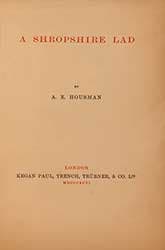To an Athlete Dying Young
Critique • Text
 First edition of collection
First edition of collectionFirst publication
In A Shropshire Lad poetry collection, 1896
Literary form
Poem
Writing language
English
Author's country
England
Length
28 lines
Deadly advice to the living
"To an Athlete Dying Young" is a beloved poem often taught to high school students—but probably shouldn't be.
I can see why it appears in anthologies for instructing adolescents. A.E. Housman's poem concerns the death of a young person and the fleeting nature of youthful achievement. And it is a well-written poem with clever turns of phrase embedded in an easy-to-read syntax. Its light style—regular in rhyme and rhythm—may be a relief for students who struggle with some of the more complex verse of old and the more chaotic modern poetry to come.
But I suspect the main reason "To an Athlete Dying Young" seems suited to classrooms is that it offers a glib moral paradox, easily taught and potentially received as a profundity by young minds (or by any minds, for that matter). Something like: those who die after early success never have to suffer the fading of their glory.
In the pithiness of its moral it resembles such old schoolbook standards as Percy Bysshe Shelley's "Ozymandias" (all things pass, even the works of the great and powerful), Edwin Arlington Robinson's "Richard Cory" (riches can't buy happiness), and others you may recall from your own school days.
Not fade away
Yet if we go back to Housman's poem to refine what he's trying to say—to get beyond the truism—we run into uncomfortable questions.
Is it better for someone to die before their fame fades, as the poem's athlete has managed? Is Housman approving suicide after early success? Is he advising angst-ridden teenagers it's better to burn out than to fade away?
Immediately the poem's fans answer: of course not. Housman's just pointing out an irony. His praise of the young athlete for dying or taking his own life ("Smart lad, to slip betimes away / From fields where glory does not stay") should not be taken as sincere. He is describing the celebratory attitude of the townsfolk sarcastically.
But Housman is seldom insincere and this poem gives little support for an entirely ironical interpretation. For one thing we never get the story from the point of view of the dead youth, his friends or his family—who no doubt preferred him to stay alive. The expression of a life-affirming sentiment would cast the town's adulation after death in a different hypocritical light. As the poem stands though, I see small indication of it being a critique. At most, it's partly ironic—and partly sincere.
If you read the volume A Shropshire Lad, in which "To an Athlete Dying Young" first appears, you may also ask a different set of questions. The poetry collection is largely concerned with death in Britain's military adventures, for which young men are glorified. This poem leaves open how the local running champion died, but the possibility that he is being brought home from a battlefield may be inferred by a reader of the larger work though. Understanding the poem this way would place it beside that other touchstone of English patriotic verse in wartime, Laurence Binyon's "For the Fallen" ("They shall grow not old, as we that are left grow old: / Age shall not weary them, nor the years condemn"). Is the lad's sacrifice for queen and country really what underlies the town honouring him in death? Is the celebration of sport a stand-in for what's really on Housman's mind: the glorious sacrifice of young man in war?
What's missing
These questions are, naturally, speculative. They're unsupported by the text alone. But they arise from the literary and social context. Surely they must have arisen in the minds of the poem's early readers during Britain's deadly wars of the time when young men were being brought home in boxes.
The questions also arise from what's missing from the text. There's no mention of how the lad died, which surely would affect how people received the death. Whether the death was a suicide, as some readers have inferred, or whether it was in battle as others have, must affect how we understand the poem.
I can hear the protests continuing: this poem is about just what the title says it's about. "To an Athlete Dying Young" is just pointing how such a tragedy is marked, how an accomplished life goes on in people's memory when death comes early, regardless of the cause of death.
Maybe. First reading of the poem can be affecting and provocative. But the more I read and think about it, unlike my experience with most poetry, the more shallow and less compelling it becomes.
— Eric
Critique • Text

